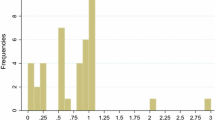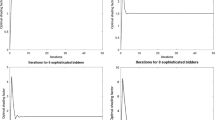Summary.
This paper studies ‘knockout’ auctions, typically organized by bidding rings, in which the winning bidder makes side-payments to all losing bidders. These side-payments provide an incentive for the ring members to bid higher than they would have in an identical public auction. As a consequence, neither the realized price nor the total payments of the winner are unbiased estimates of the item's price in the absence of collusion. This paper evaluates the extent of this overestimate in the independent private values case, for first and second price post-auction knockouts. Bids are not independent of the sharing rule but transfers from the winning bidder are. Further, bidder payoffs are independent of both the auction format and the sharing rule. The “overbidding” in the knockout is increasing with the dispersion of bidder valuations and of significant empirical relevance. This paper's results can be used to obtain an unbiased assessment of the damages inflicted on the seller.
Similar content being viewed by others
Author information
Authors and Affiliations
Additional information
Received: May 1, 1996; revised version: September 7, 2000
Rights and permissions
About this article
Cite this article
Deltas, G. Determining damages from the operation of bidding rings: An analysis of the post-auction `knockout' sale. Econ Theory 19, 243–269 (2002). https://doi.org/10.1007/PL00004213
Issue Date:
DOI: https://doi.org/10.1007/PL00004213




